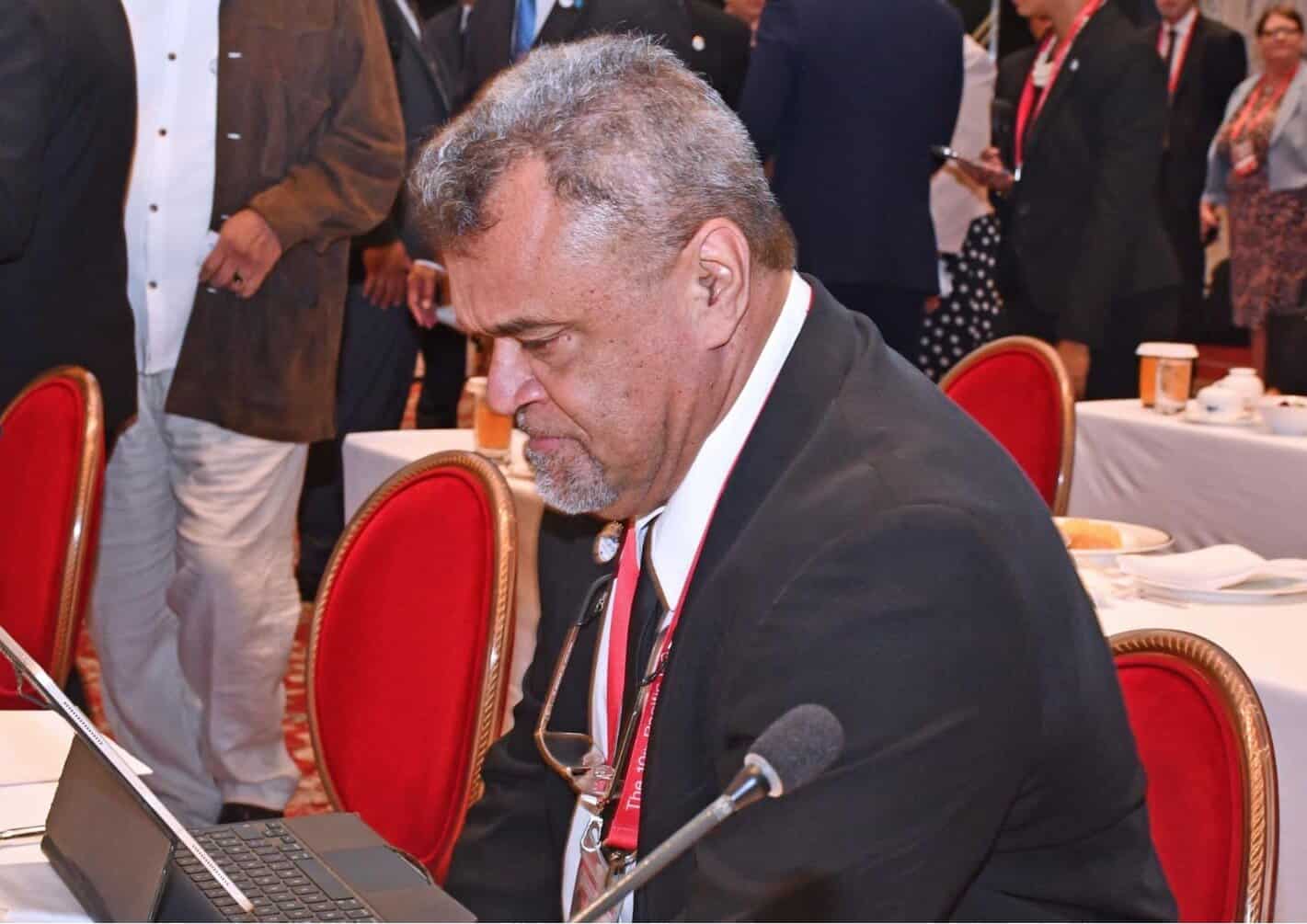By Nic Maclellan,Reporter Ib
Copyright islandsbusiness

FOR months, the town of Thio went without a local doctor.
The east coast mining town in New Caledonia, with a population of 2,500 people, has been going through tough times. Last year, during months of clashes between Kanak protestors and French security forces, Thio’s economy was devastated. Some mining operations remain shuttered, jobs remain hard to come by, and health services are suffering.
Hoping a new locum will arrive soon, Thio residents have relied on doctors travelling once a week from the town of La Foa – a distance of 80 kilometres by road across the central mountain chain. In urgent cases, Thio residents must rely on telehealth, or travel 120 kilometres to the capital Noumea.
New Caledonians are still dealing with the economic and social fallout of last year’s crisis, and there is ongoing uncertainty over the French dependency’s political future, as negotiations falter for a new statute called the Bougival Accord. During six months of conflict last year, many businesses closed and one in six private sector workers lost their job. The health sector suffered significant staff turnover, with French doctors, nurses and paramedics leaving the islands.
Even after 172 years of French colonial administration, most doctors and health specialists in New Caledonia still come from metropolitan France. Despite training programs like Cadre Avenir, the French State has been slow to reform the training systems that could qualify more New Caledonians – and especially indigenous Kanak – for medical posts (It’s a sharp contrast to other Pacific nations: the Suva Medical School in Fiji was founded in 1885 to train rural medical practitioners, and the first three indigenous Fijians graduated as medical officers in 1888).
Visiting New Caledonia, I recently met a range of people in the health sector, from the minister responsible for health and social services, to hospital directors, health unions and frontline staff. Their stories highlight a system under stress, but also many efforts to recruit, rebuild and develop a broader definition of health and well-being, better adapted to New Caledonia’s Pacific realities.
Losing specialists
The Centre Hospitalier Territorial Gaston-Bourret (CHT) is the major public hospital in New Caledonia. Its 15-hectare Médipôle complex, located at Koutio on the outskirts of the capital Noumea, opened in December 2016. Today, CHT is the largest public sector employer in New Caledonia.
Dr. Thierry de Greslan is head of neurology, but also serves as director of the CHT’s Commission Médicale d’Établissement, the institution’s representative body of doctors, pharmacists, dentists and midwives. New Caledonian-born, he’s proud of their work for the community: “Our hospital is very up to date, offering the same level of care as a hospital in Paris, Marseilles or Sydney.”
However, even in good times, there is significant turnover of medical and nursing staff in France’s overseas territories. “In our case at CHT,” de Greslan said, “it’s normally at least 20% turnover in our medical and paramedical staff, especially of nurses – and we don’t train enough nurses in New Caledonia. If you do initial training here, many still go to France to complete their training, especially for specialist staff, and it’s hard to get them to come back.”
Last year, as riots erupted on 13 May, the area around CHT became a no-go zone as protestors erected barricades, French riot police launched tear gas, and nearby buildings were torched.
“It was very traumatic for our staff during the riots,’ de Greslan said, “because all the roads to Médipôle were cut off and we were trapped here. The staff and patients were hostages, and some people were even fearful to come and access the emergency service.”
A study of the 2024 health crisis reports that “the psychological trauma stemming from the violence and economic losses is expected to have long-lasting consequences, with victims among all classes of New Caledonia – a context where human resources for basic healthcare are already low.”
Most of the senior medical staff amongst CHT’s 2,500 strong team have been recruited on contract from France – but six months of conflict last year led to an exodus of staff.
“Many people left during the crisis,” de Greslan said, “and those who were scheduled to travel here didn’t come. We had doctors and nurses who cancelled their postings, and so we lost around 25% of our effectives. Some of our long-term staff also left, because of feelings of anger, insecurity or political concerns. Others quit because their spouse lost their job in another industry, and the family decided to leave.”
While some CHT departments only lost a few staff, others were decimated during the riots and clashes that wracked New Caledonia. For de Greslan, “this created problems for people requiring regular care: those with diabetes who weren’t treated, people with metastasising cancers, or people requiring regular prescriptions. Due to lack of staff, we had to close 100 beds at the hospital – even today, we still have 60 beds closed.”
By November 2024, all CHT’s ophthalmologists had left, along with most of the hospital’s oncologists, setting back the treatment of cancer patients. CHT had a small gastro-enterology service, with four doctors and 21 beds – during the conflict, three of those doctors left New Caledonia, and one retired.
In a media release in August, CHT management announced that there was ongoing and unprecedented pressure on its services, particularly in the emergency department. Due to the shortage of healthcare personnel, CHT hospital services are already “saturated” after the closure of hospital beds in several departments, combined with the closure of many municipal medical centres and private general practices.
Bruno Calandreau, president of New Caledonia’s College of Physicians said that the departure of doctors after the May 2024 riots included general practitioners in private practice as well as hospital staff.
“It’s the family doctor that you have known for a long time, who knew everything about your health and who could answer your questions immediately when you were sick,” Calandreau said, noting that working-class suburbs across Noumea are the worst affected.
CHT’s Thierry de Greslan agreed the loss of GPs placed extra pressure on emergency wards at the main public hospitals.
“The network of local GPs and community nurses was also damaged at this time,” he said. “There were greater effects in the Northern Province, and the hospital there had even larger staff turnover – not just 25%, but up to 40%, and in some services 60%. So our teams were working under great stress, and we had a lot more absenteeism and sick leave. It was a real but unrecognised health crisis.”
Recruiting new staff
Problems in the health sector are part of a wider economic and social crisis that has lasted for more than a decade. In response, successive governments have sought to reform the health sector. After years of consultation, a national health strategy – the Do Kamo Plan – was adopted for 2018-2028. Do Kamo is based on three pillars: reforms to the tax system to better fund health programs; simplification of governance of the health sector; and increased focus on prevention and community health, rather than hospital-based care.
Claude Gambey is Minister for Health and Social Services in the Government of New Caledonia. A member of the pro-independence Parti de Libération Kanak, Gambey said the current government was eager to implement more of the Do Kamo recommendations. But with programs delayed by the COVID pandemic and the 2024 conflict, there is a way to go.
Gambey’s current priority is staff recruitment and addressing financial constraints on the health sector, but – like other government officials I met – he was critical of media coverage that highlights the problems, without noting the response from health authorities.
“At the end of 2023, there were around 1,000 doctors practising in New Caledonia,” he told me. “As of January 2025, there were 901, according to the College of Physicians, so we’ve only lost around 100. Since then, we’ve recruited some overseas doctors and the College of Physicians has informed me that the number of departures has slowed. It’s the same for nursing staff, with a complement of about 1,400 nurses. In April this year, we lacked about 200 nurses. Today we still need 66, but the crisis is resolving bit by bit.”
“It’s in the area of specialists that the hospitals are weakened, and for me, addressing this is a priority, as they are our last rampart,” he said. “The hospitals are suffering, lacking specialists in oncology, emergencies, gastro-enterology, paediatrics, ophthalmology, psychiatry and children’s psychiatry.”
Seeking an extra 70 doctors, Gambey and health officials have travelled to France, visiting nursing conferences and medical schools to publicise opportunities in New Caledonia. But he highlighted a shortage of specialist medical staff across much of France and its overseas dependencies, which has made recruitment more difficult.
In the past, doctors have mostly come from metropolitan France on short term contracts, but Gambey noted that “we’ve authorised the recruitment of 35 overseas doctors to work across the three provinces, who’ve come from all over: India, Vietnam, Norway, Mexico, Morocco and Burundi.”
“This is a start but we need more,” he said. “So in February we’ve created a medical reserve scheme – registering interest from retired doctors, midwives and health staff who might assist during a crisis like the COVID pandemic.”
The government is also funding extra places in Noumea’s nursing schools: 18 new nurses graduated in July, with another 14 to graduate soon.
Since 2023, New Caledonia has begun to change regulations to allow specialist nurses to practice as Infirmiers en pratique avancée (IPA). These nursing staff are more skilled than general nurses and can be delegated tasks by doctors, working as specialists in disciplines like emergency health, midwifery or mental health. Gambey explained that “75 IPA candidates will go to the French nurse training centre IFPSS, and after university training in France, they can go to ‘medical deserts’ in rural areas that currently don’t have a doctor.”
Serving the rural provinces
In April, the Southern Province administration launched an initiative to boost recruitment of nurses, with a package of salary benefits and housing support. This includes a financial bonus of 730,000 CFP Pacific francs (A$11,000) for one person or 1,240,000 CFP (A$18,600) for a family, with gift vouchers for tourism and leisure services. After paying for up to three one-way plane tickets, the province also provides assistance to find housing and cover the initial rent.
This focus on recruitment in the Southern Province, however, has angered some Kanak politicians, given the loss of health staff is more pronounced in the North and Loyalty Islands, two rural provinces with a Kanak-majority population. An April 2025 study suggested there was a 5% shortfall of medical staff in the South, but 29% in the North and 55% in the outlying Loyalty Islands.
President of New Caledonia Alcide Ponga agrees that the shortage of medical staff is not evenly divided across the islands.
“It’s in the Loyalty Islands especially and in the North that people are going without help” he told me. “In contrast, the South is well served, although we lack some specialists. In terms of the number of doctors per capita, we’re not completely different compared to France, but they’re badly distributed – most are in the South. So this can cause problems for those without means.”
In the two rural provinces, health unions have had enough, launching industrial action to press for government action. On 30 July, health workers from the USTKE trade union confederation held a day long stoppage, rallying outside medical and community centres on Lifou in the Loyalty Islands. The strikers called for the immediate recruitment of medical staff: only nine of 18 vacant doctor positions have been filled.
USTKE has also organised strikes in the Northern Province. A meeting with provincial health authorities in mid-August couldn’t resolve union concerns, and on 21 August, the STKE health sector union stopped work in all health centres and dispensaries in the Northern Province.
Their statement of grievances highlighted a diverse range of problems: “The closure of essential medical services, including emergency wards; the lack of staff in medical centres and dispensaries; the physical and moral exhaustion of caregivers, often left alone to manage vital situations; the absence of dialogue with administrative officials who ignore our alerts. Health workers are motivated solely by professional ethics, often at the expense of their own health and we’ve seen a series of resignations, frequent sick leave, and widespread mental fatigue.”
In a statement, Northern Province politician Valentine Eurisouké – herself a former health minister – confirmed that eight new doctors would soon be deployed across the province, with six from France and two from other countries.
Members of the government want the focus on staffing to be complemented by action to reform financing for health services. Key superannuation and insurance schemes have been running at a loss for years. However attempts to reform government spending have been stymied by employer resistance to new taxes, and anger from workers and the elderly who bear the cost of extra charges.
On 14 August, the Congress of New Caledonia debated a new legislative package of heath reforms, including the overhaul of the medical transport and evacuation system. As health minister, Claude Gambey also wants to untangle the complicated governance of the medical system, with overlapping authority held by the French State, private practitioners, New Caledonia’s three provinces and also municipal councils.
However the legislation sparked anger from consumers, while health unions and medical associations complained about lack of consultation. The Federation of Health Professionals – uniting ten health unions –unsuccessfully called for the immediate suspension of the legislation, arguing: “These texts were drafted without consulting professional representatives. They ignore the submission already made to government and risk exacerbating existing imbalances in access to care.”
Others criticised the introduction of new charges that will hit the most vulnerable, such as 100 CFP extra per box of medication and an increase to 500 francs for each round trip for non-emergency medical transportation.
Respecting local knowledge
With New Caledonia due to hold local elections before June 2026, Gambey said his time as minister was limited, “so like a mason, I want to build the foundations and leave the decoration to others.”
“The Do Kamo Plan sets out our model for our health system,” he explained. “It says that we have to develop a New Caledonian model that must be sustainable, because the one we have now is unsustainable. It must also be durable, taking account of New Caledonian knowledge about health, using our physical and natural capital. Finally, this model must be accepted by New Caledonians, because they themselves are the main actors in improving their own health.”
“For years,” he said, “I’ve been calling for an integrated system around health, as you see in other Pacific countries. Health care should not be imprisoned in hospitals: we should promote health on the sporting field, at work, in the churches and in the tribes – in our custom. Today, health is the business of doctors, rather than customary chiefs.”
The Kanak politician noted that “in the past, our health systems didn’t take account of traditional knowledge. There are plants here that have been used for centuries that are not valued. But here in New Caledonia, we have a number of research centres that could help us to promote awareness of useful plants that have antibiotic, analgesic or anti-inflammatory effects.”
He also highlighted the lack of funding for prevention: “We recently introduced a tax on sugar, and we want to put more of these resources into childhood health programs. We have to work on prevention at the start of life, at kindergarten and primary school, to avoid problems later in life: obesity, diabetes, other non-communicable diseases. Health care is just part of the picture – the rest is nutrition, sport, the environment and other factors.”
While stressing the quality of New Caledonia’s hospitals, CHT’s Thierry de Greslan acknowledged there was a need to restructure priorities, looking beyond hospital-based care.
“Only 1% of budget resources go to prevention,” he said. “The new sugar tax creates some extra funds, but honestly, prevention is a catastrophe in New Caledonia. Everyone know it, but it’s hard to change, to address nutrition and extend education on diabetes, hypertension and obesity. Cannabis and alcohol are a plague here, and there’s lots of road trauma.”
De Greslan said the debate around last year’s health crisis is an opportunity to think about models better adapted to the realities of the Pacific islands.
“For a country as large as ours, telehealth could be very important, where you could access a doctor at a distance. This is a major project for the future, especially for the Northern and Loyalty Islands provinces. But overall, our capacity to innovate, to rebuild, to rethink and to work together is very positive. Because we’re a bit smaller than hospitals in France, we can change.”
For Claude Gambey, the COVID pandemic highlighted the need for greater co-operation with neighbouring countries in Oceania. He wryly noted that Australian medical degrees aren’t recognised in France, but New Caledonia happily sends patients to Australia for treatment under the EVASAN emergency evacuation program.
“My sentiment is that we are an island nation in the Pacific, surrounded by ocean and only two hours from Australia,” he said. “We have to build up our supplies, our staff, rather than just rely on France. We saw this during the COVID pandemic, when we were completely isolated. We had to beg Air France to bring vaccines to us, because they were prioritising chocolates and cakes.”
The health minister would like to train staff at James Cook University in Australia or medical schools in Fiji, “but we have a situation where all medical qualifications must be judged in reference to French standards – which is one reason why Australian degrees are not recognised in New Caledonia. This has to change: we’re in a region of islands, some 22,000 kilometres from metropolitan France. We must govern our own health.”



